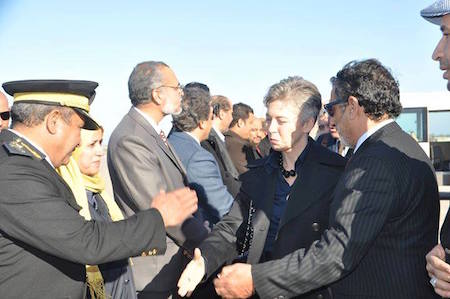By Libya Herald staff.
Malta, 10 January 2015:
The pro GNC National Salvation government based in Tripoli, and not recognized internationally, said on Thursday that it was launching a security plan for Tripoli and its suburbs.
The implementation of the plan, reported the pro GNC LANA news agency, depends on the ‘’manifestation and activation of the police, crime prevention and prosecution through the courts of the most wanted criminals, information collection and assessment, and the taking of immediate action’’ on these issues.
The plan is also aimed at ‘’securing critical infrastructure, public and private, including parks and spaces downtown, traffic in the main streets with both vehicle patrols and foot patrols. Personnel from Tripoli Security Directorate and Criminal Investigation Units, Drug Enforcement Units and the Central Security and the Deterrence Force as well as some other security agencies that will take all the necessary measures and arrangements to fulfill this plan’’, the official statement said.
The National Salvation Government of Omar Al-Hassi, supported by the GNC and Misrata-led Libya Dawn militias has been keen to show since the occupation of Tripoli that it has executive capabilities and the ability to influence events in Tripoli.
The Salvation Government has been keen to ensure the smooth supply of bread, fuel, cooking gas, electricity and above all show that it can ensure a higher level of security in the capital than had existed under the official government of Abdullah Thinni.
To an extent, security had improved in Tripoli just after its invasion by Libya Dawn forces. However, there has been a return to the atmosphere of insecurity felt by Tripolitanians as car-jackings and kidnappings seem to be rising again.
The lack of strong central institutions such as police, army, public prosecution office and judicial system were the cause of the power vacuum that left the field open for criminal elements to have a free hand. This was exacerbated by presence of armed militias in the capital that inhibited and often confronted the official state security apparatus. A proportion of the criminal activity is attributed directly to the militias – the very force looked to to impose security.
It will be interesting to see the degree of control that either the Salvation Government or the GNC can impose on their partner militias.
All the previous governments of Kib, Zeidan and Thinni had failed to impose a control over militias or impose the superiority of the state security apparatus. This failure also covered the period under the GNC tenure, so it is not clear how the remnants of the GNC would succeed where a full GNC had failed.
Too many members of the official state security apparatus do not bother turning up to work out of simple laziness or out of fear of intimidation by militias. And as long as militias are not enlisted under an official security apparatus and continue to act independently, it will be difficult for any government – in Tripoli or Beida – to control security in Tripoli or Libya.
[/restrict]







